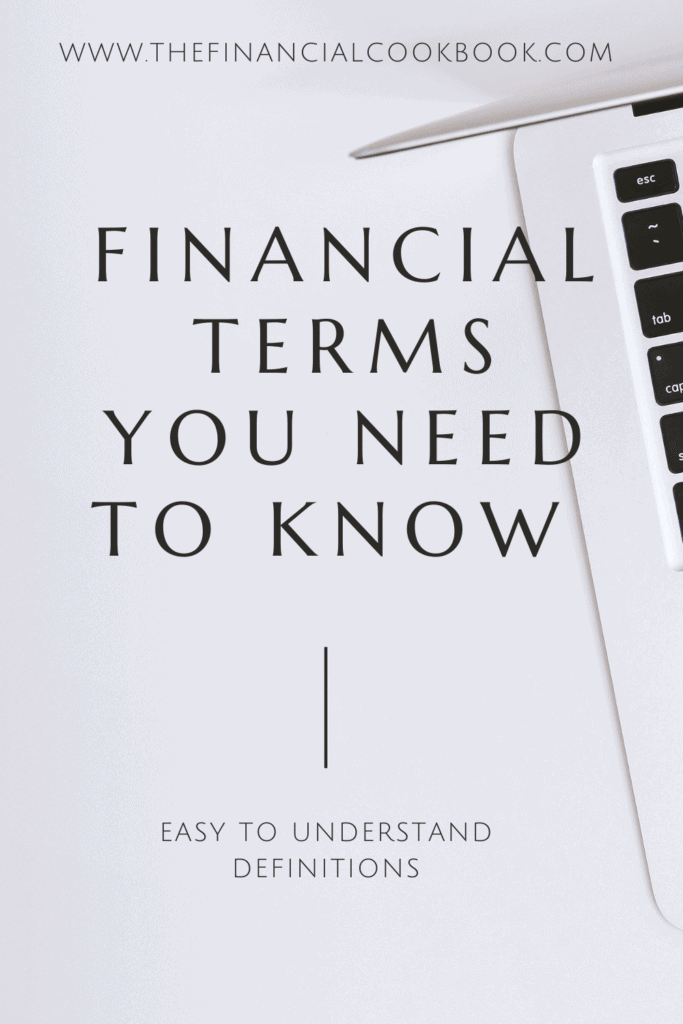Ever read a financial or real estate article and have no idea what they're talking about? It sounds like a different language sometimes, right!? Then you google it and the definition itself sounds like gibberish as well so you still have no clue? Been there!! Therefore, I've created a list of actually easy-to-understand real estate and financial definitions used in my articles.
When I first got started in real estate, investing and finance, I was like a deer in headlights. It was intimidating because the words were big and even once explained to me, I still had no idea what they meant.
It can be very frustrating.
That's actually exactly why I started this website…to teach other women what I've learned in the financial and real estate world to help them accomplish their financial goals as well!
Real Estate, Stock Market and Financial Definitions You Should Know
- 401k- essentially a retirement account offered by your employer and is an investment in the stock market.
- Actively managed– Refers to your 401k or brokerage investments. This means you pay the brokerage a % fee to manage your portfolio for you [see passively managed as well]
- After Hours Stock Activity- This is the dollar amount and percentage the stock price has changed after the close of the stock market. The stock market is open 9:30am – 4pm EST.
- Average Volume (stocks)- This is the average quantity of shares that the stock is normally traded at
- Compound Interest- Essentially, it means interest on interest. If you earn 6% interest on a $100 investment, you'll have $106. Now that $106 will start earning the 6% interest, etc. (Side note: we love compound interest!)
- Correction- When the Stock Market takes a 10% or more dip. It “corrects” when it goes back up to the previous level
- Emergency Fund– a separate savings account that has at least 6 months worth of funds to cover your expenses in case of emergency (this would include rent/mortgage, food, utilities, etc)
- Dividends– When a corporation (or set of corporations) issue a payment to their shareholders. Example: Disney's dividend payment is currently $1.76 per year. This means that for every share you own of Disney, they will give you $1.76 each year. (This is a separate payment from the possible gains of the stock market, which you automatically receive) (Side note: Dividends are awesome!)
- Dividend Stock– a company's stock that gives dividends to their shareholders on an annual, bi-annual, or quarterly basis
- Dividend Yield- This metric is the annual dividend divided by the stock price. It compares a company’s annual dividend to its share price.
- Domain– This is essentially the website address or URL. For example, the domain of this website is www.thefinancialcookbook.com
- Emergency Fund- This is liquid money you'll want to keep in savings to cover at least 3-6 months of expenses in case of emergencies like job loss, medical bills, etc.
- Gross Income– Money you make before taxes and other deductions (including company benefits) are taken out [see net income as well]
- High Yield Savings Account– A savings account that pays interest at around 20-25x the interest rate of a normal savings account at a traditional bank. No, this isn't too good to be true. The catch is that it's an online bank, they don't offer checking and often don't offer debit cards. Therefore, you'd still need to keep your checking account. They also often have limits on how many times you can withdraw money, due to the high interest they provide.
- HOA- Home Owner's Association- An association that creates rules for a housing community to abide by. Many housing communities have an HOA. They may mandate that homes in that community only paint their house a certain color, not park cars on their lawn, have guest permits, etc. In my opinion, they can make a housing community much nicer since more rules are in place that need to be adhered to. On the downside, a monthly HOA fee is typically required to purchase a home in that community.
- Market Capitalization– It shows the dollar value of a company's outstanding shares.
- Mortgage Broker– This is the person that administers a home mortgage loan to you.
- Mutual Fund– a bundle of different stocks, bonds or other assets. Mutual funds tend to be “safer” investments since the money you invest in one mutual fund is spread out among different stocks, bonds or other assets. If one company's stock in the mutual fund declines, you won't be as affected by it in a mutual fund since the portfolio is diversified
- Net Income– Gross Income minus taxes and deductions (company benefits, 401k, etc). Net income is your take home pay that actually ends up in your bank account. [see gross income as well]
- Open Stock Price- This is the price the stock started at the open of the market at 6:30am EST
- Passively Managed– You manage your positions in your brokerage account and invest in strong positions [see actively managed as well]
- Payoff Statement– Essentially it's a quote provided by your current loan broker. The statement will tell you the cost of taking your loan to another bank. (it may have 3-4 things on the statement and usually is no more than $250 in total)
- Payout ratio– The payout ratio of a stock is the amount of money in dividends per share divided by its earnings per share.
- P/E Ratio- This is the company's share price divided by its earnings per share. This metric helps you understand how “expensive” a stock is based on its profitability. Is it undervalued or overvalued based on the profit the company is bringing in?
- Points– You may hear the term “paying points”. Points are usually mentioned when discussing a loan you are taking out. A point is equal to 1 % of the loan. If you are taking a loan out for $100,000 and they want you to pay 2 points to get a particular interest rate, you will pay $2,000 to get that interest rate. There are also no point loan options, so keep an eye out for that.
- Positions– A single stock in your portfolio. For example: If you own 3 different company's stocks, you have 3 different positions
- Return on Investment (ROI)– the return (money) you make on a particular investment. (Think of ROI when making decisions for every investment you make) To Calculate ROI= (Current Value of Investment minus Cost of Investment)/(Cost of Investment)
- ROTH 401K– 401k investment that has already been taxed and will not be taxed when taken out after the age of 55 [see traditional 401K as well]
- Share- a unit of ownership in a corporation (For example, you own 2 shares of Disney)
- Shareholder– You are considered a shareholder if you bought positions of that corporation or mutual fund.
- Stock Price- This is the amount the stock is trading for (or also known as its market value).
- Traditional 401k- 401k investment that is not taxed until the money is taken out after the age of 55 [see ROTH 401k as well]
- Underwriting-determining the risk of something or someone (Ex: Banking loans must go through underwriting to determine how risky the loan is.)
- Vesting/Vesting Period- essentially means ownership. It means you now own the investment. Some companies have immediate vesting and others will vest at a certain time frame or month
- Volume (Stocks)- The quantity of shares that a stock was traded.




Lovely just what I was looking for.Thanks to the author for taking his clock time on this one.
My spouse and I absolutely love your blog and
find the majority of your post’s to be what
precisely I’m looking for. can you offer guest writers to write content in your case?
I wouldn’t mind composing a post or elaborating on many of the subjects you
write concerning here. Again, awesome site!
Thank you a lot for sharing this with all of us you actually understand what you
are talking approximately! Bookmarked. Kindly additionally talk over with my web site =).
We could have a link exchange agreement between us
Hey I know this is off topic but I was wondering if you knew of any
widgets I could add to my blog that automatically tweet my newest twitter updates.
I’ve been looking for a plug-in like this for quite some time and was hoping maybe you would have some
experience with something like this. Please let me know if you
run into anything. I truly enjoy reading your blog and I look forward to your new updates.
What’s up, I want to subscribe for this website to obtain most recent updates,
thus where can i do it please assist.
I blog quite often and I truly thank you for your content.
Your article has truly peaked my interest. I’m going to book mark your blog and keep checking for
new details about once a week. I opted in for your RSS
feed too.
Thank you, Erna!! =)
Hey there! This is kind of off topic but I need some guidance from an established blog.
Is it very difficult to set up your own blog?
I’m not very techincal but I can figure things out pretty quick.
I’m thinking about creating my own but I’m not sure where to begin.
Do you have any tips or suggestions? Thank you
Hello, just wanted to say, I liked this blog post.
It was practical. Keep on posting!
I am extremely impressed with your writing skills as well as with the layout for your blog.
Is this a paid subject matter or did you modify it your
self? Anyway stay up the nice high quality writing, it is uncommon to peer a nice weblog like this one these days..